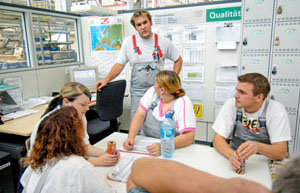How do employees participate in designing their work?
Participation includes both institutionalised forms of co-determination through elected organs of interest representation (works/staff councils), and direct participation by the employees themselves, whether in teams or as individuals.
Our research deals with possibilities and forms of employee participation in the changing world of work.

Acceptance-based social innovations in the world of work (e.g. in the areas of work organisation, competence development, and management) are hardly imaginable without participatory, inclusive, and empowering processes. These are becoming increasingly important in society and in the workplace.
At the societal level, one question is how civil society can be actively involved in dealing with major issues of the future (e.g. how can and should digitalisation be shaped?) Closely related to this are questions about the required labour and social policy options to achieve maximum social benefit.
With the opening up of enterprise boundaries in innovation processes (open innovation; co‑creation), a broad spectrum of new social practices for involving different stakeholders has emerged (lead user method, crowdsourcing and innovation competitions, living labs, real experiments).
The Social Research Center Dortmund is active in both fields. A good overview of the concepts involved can be found in the following congress volume „Innovations for Society – New Ways and Methods for Unfolding the Potential of Social Innovations“.
At the company level, the debate is currently dominated by the design of digital technologies. In the debate about Work 4.0, employee orientation is considered a key success factor. This is not just about the introduction and optimisation of digital technologies through employee involvement, but above all about employees influencing the design of their work to promote “good” or “decent” human-oriented work, through participatory approaches.
An example of participatory approach can be found here
Appropriate management concepts and leadership approaches are an important starting point for mobilising the experience-based knowledge and participation of employees. Managers’ understanding of leadership and their skills at different hierarchical levels strongly influence the extent to which the potential of digitalisation can be exploited for the purpose of good work. The current challenge for managers is that all interacting elements in the operational interaction structure (such as people, machines, organisational processes, and work tasks) are permanently changing. Digitalisation processes must be managed and shaped in order to enable employees to perform their work in a way that promotes their individual development. Furthermore, their demands for participation and co-design must be taken into account. To achieve this, the structure of interaction in the enterprise must be understood and managed as a socio-digital system. This comprehensive understanding characterises the research and empirical work of the Social Research Center Dortmund (Sozialforschungsstelle, sfs).

At the European level, the Social Research Center Dortmund is involved in the European Workplace Innovation Network (EUWIN). Based on modern socio-technical approaches, there is an intensive exchange of research results and practical experience with participation-oriented concepts. The focus is on mutual learning and increasing the practical impact (diffusion of corresponding concepts into enterprises).
Current Projects
The current challenge for managers is that all interacting elements of the corporate interaction structure, such as people, machines, organizational processes, and work tasks, are constantly changing. Digitization processes must be managed in such a way that employees are enabled to perform their work in a way that is conducive to personal development, and that their participation and co-determination rights are realized. This can only succeed if the structure of interaction within a company is understood and managed as a socio-digital system. Consequently, the eLLa research project aims to enable managers to control sociodigital systems by building up interaction competence.
Publications
Christine Carolin Best: Wissensweitergabe bei Vorsitzwechsel im Betriebsrat – Betriebliche Mitbestimmung im Zeichen des Generationenwechsels, Sozialforschungsstelle, Beiträge aus der Forschung, Band 206, Dortmund 2020
Download as pdf (in german)




![[Translate to English:] [Translate to English:]](/storages/zentraler_bilderpool/_processed_/a/f/csm_Kontakt_b86e8d8ecc.png)
![[Translate to English:] [Translate to English:]](/storages/sfs-sowi/_processed_/6/c/csm_Glasfront_sfs_Header_eae6d325d3.jpg)
